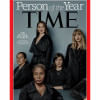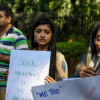The #MeToo campaign: Only a start

Tales of global-media-mogul Harvey Weinstein's decades of sexual abuse of women in Hollywood have been unravelling over the last few weeks. With every passing day new stories are coming out, and more and more women are finding the courage to come out with the truth of their own harrowing experiences with Weinstein. While it is a sad testament to the state of our world that all these women have had to suffer for years in absolute silence, at least they will finally get some justice; or so we hope. In a world where a man gets elected as president after having bragged about sexually abusing women, we can really only hope.
Following the global backlash against Weinstein and with focus back on sexual abuse, actress Alyssa Milano tweeted, "If all the women who have been sexually harassed or assaulted wrote 'Me too' as a status, we might give people a sense of the magnitude of the problem." Within 24 hours, the hashtag was tweeted at least half a million times, with countless men showing their support as well. It is heartening to see so many women starting to speak about that which we as young girls were always taught to keep hidden away, for fear of "public shame".
Sexual harassment is not a new, nor a simple phenomenon. Weinstein's case, and cases like it are not even the tip of the iceberg. Powerful men have historically always seized that which they desired, be that women or any other form of booty—make no mistake, it is this perspective of viewing women as property, something to be owned, that leads to much of this kind of sexual abuse. Womanisers are often applauded for similar actions by a large portion of the public, and the women are vilified or even pilloried. Nonetheless, relentless abusers like them only constitute a small portion of the problem.
Few among us are lucky enough to be born of the female gender and reach adulthood without having experienced any form of sexual abuse or harassment. While most of the perpetrators are people we tend to know or trust, it is the streets and marketplaces of our cities that are truly full of horrors. Some years ago, I heard a particular line in some insipid American TV show, which really cut me to my core: A female character was telling her male counterpart, "you know the worst thing you fear when you think about going to prison, well we women fear that every time we leave the house". I had always known that men and women lived completely different lives, but not until that moment had it dawned on me just how different.
If one half of the population has to live in fear of the other, then there is something seriously wrong with our world. There will always be criminals and villains of all sorts around us, but if we women have to live in fear of sexual abuse or harassment from any random man, then whatever is wrong is embedded deep in our culture or in our biology. The latter, the biological explanation, has to be false; if for no other reason than the fact that our species has survived innumerable challenges for the last hundred millennia with astounding success. That would not have happened if only half the species were invested in that success.
Without pursuing the anthropological origins for the cultural embeddedness of this violence, we can state with some certainty, just as people like Simone de Beauvoir, Judith Bulter, and a host of others have, that much of this comes from identifying both women and their "chastity" as some form of private property. While civil society today gasps with incredulity when they hear of such archaic practices as checking for a young girl's chastity by checking her wedding sheets for virginal blood, these same people revel in "lighthearted" jokes that shame a woman with a mind of her own. Take for example a very common joke which goes: A key that can open many locks is called a master key, but a lock that can be opened by many keys is a shitty lock. Not only do these jokes instantly turn women into "booty", but they also turn abusive philanderers into heroes.
We live in a better world today than that in which our predecessors did. One does not even require perusing through tomes like psychologist Steven Pinker's The Better Angels of Our Nature: Why Violence Has Declined, to see that a world where women get together and start casting off "shame" that was never theirs to begin with, and start speaking openly about their pain, is better than the one where they were gagged. But we still have a long way to go before any of us, or all of us, feel safe; before we women feel safe standing among a group of men, as any random man feels standing among a group of women. The #MeToo campaign is only a start, and we await a cultural revolution which shall change the way women and their sexuality is viewed by our male counterparts.
Fardina Habib is currently working as a branding expert in the corporate sector.










Comments